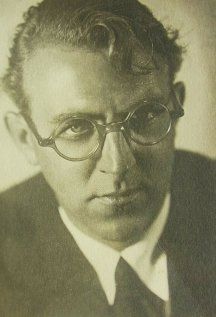Carl Ueter
Carl Ueter was born 18 January 1900 in Münster (Germany). He studied Christian music at the Bischöfliche Kirchenmusikschule (Episcopal Church Music School) in Münster from 1915 to 1918. During these years he was also organist at different churches in Münster. He worked as a teacher for Gregorian musicology, music theory and violin at the Bischöfliche Kirchenmusikschule after the completion of his studies, but attended the composition class of Fritz Volbach at the University of Münster further on.
In the year 1921 Carl Ueter was accepted as a student of the composition master class of Franz Schreker at the Hochschule für Musik in Berlin and among his fellow students were Alois Haba, Berthold Goldschmidt, Max Brand and Jerzy Fitelberg. Further studies included Instrumental Music with Emil Nikolaus von Reznicek as well as courses with Max Seiffert and Curt Sachs.
In 1923 after his studies Carl Ueter took the position of a lecturer at the Musikhochschule Mannheim and became later in the same year répétiteur at the Stadttheater Münster. Still in 1923 the music director of the Stadttheater Münster, Ewald Lindemann, followed an appointment as a music director at the Stadttheater Freiburg im Breisgau and took Carl Ueter with him. Until the outbreak of World War I in 1939 Carl Ueter took the position of the 1. Kapellmeister at the Städtische Bühnen Freiburg.
Between 1940 and 1944 Carl Ueter fulfilled military service and got into US war captivity. Until 1945 he was arrested at the prisoner-of-war camp at Bad Aibling.
In 1946 the Hochschule für Musik Freiburg was founded and Carl Ueter took a position as a lecturer there from the very beginning. In 1950 he was appointed professor and until his retirement in 1965 he held masterclasses in conducting,[1] as well as courses in counterpoint and score reading. Among his most notable students are Hans Zender, Werner Jacob, Gerbert Mutter, Isaac Karabtchevsky, Günther Wich, Wolfgang Gayler and David Machado. Additionally he directed the Opera School and the Music School Orchestra. In this position Carl Ueter conducted the first public opera performance of Fritz Wunderlich in 1954.
Beside his work as a teacher Carl Ueter always composed music of all genres of classical music including chamber and vocal music, but also operas and orchestral compositions.
Carl Ueter died on 30 September 1985.
Carl Ueter composed music for all genres - at least two symphonies (No.1 premiered in 1937 under Konwitschny), the opera "Die Erzgräber", songs, and chamber music.
In my possession are autograph manuscripts of a String trio, of the Chamber cantata op.36 and the "Romanische Gesänge, for low voice and piano". In a telephone call with the widow of Carl Ueter, I got the information that most of his compositions are lost, because Carl Ueter always sent the original autographs to interested musicians and did not make copies! So actually available are just the two symphonies by him published by Schott and the works in my possession.
String trio
Among the chamber compositions of Carl Ueter are several string trios, one dates from 1927. The manuscript in my possession is dated at the end "20.4.1946" and consists of the four movements: I. Introduktion: Allegro assai; II. Adagio; III. Scherzo: Vivacissimo ponibile; IV. Rondo: Vivace
Chamber cantata op.36
The Chamber cantata op.36 by Carl Ueter was composed in 1934 and consists of two parts:
- Chamber cantata No.1 "Der kleine Tod", for baritone, cello and piano
The work was finished on 15.8.1934 and sets the poems "Der kleine Tod", "Stimme eines jungen Bruders" and "Wenn es nur einmal so ganz still wäre" by Rainer Maria Rilke into music.
- Chamber cantata No.2 "Liebe zu Gott", for alto, violin and piano
The work sets the poems "Ich liebe dich, du sanftestes Gesetz", "Lösch mir die Augen aus", "Ich will ihn preisen" and "Du bist so groß" by Rainer Maria Rilke into music.
Romanische Gesänge
The "Romanische Gesänge, for low voice and piano" was composed in 1947. The composition consists of four little songs on words by different poets from specific Romanic regions. The movements are:
I. Unmut (words by Peire Cardenal) - Provencal;
II. Einsamkeit (words by Lope de Vega) - Spanish;
III. Geistige Minne (words by Ausias March) - Catalan;
IV. Allegorie (words by Dante Alighieri) - Italian.
The work was finished in December 1947 and is dedicated to the wife of Carl Ueter.
